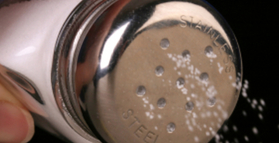 Low salt diet for insomnia and anxiety
Low salt diet for insomnia and anxiety
Posted on Wed, 11 Nov 09

Could cutting salt intake reduce symptoms of depression, anxiety and insomnia? That is what a scientific report published in the 1940s suggests, although this observation has sadly long since been forgotten.
Low salt for mental health
Based on earlier observations that a low salt diet may improve conditions such as anxiety, irritability, depression, fatigue and migraine headache the findings of an investigation of a low salt diet for “insomnia and tension states” was published in the Journal of the American Association in 1945 (1). Patients with “pronounced insomnia, nervous tension, anxiety and increased emotional liability” were instructed to follow a low salt diet with striking results.
After just four to seven days of the low salt diet the “majority of patients began to exhibit a gradual decline in nervous tension, activity drive and restlessness, accompanied by an increased ability to fall asleep and general improvement in the character of sleep. It was noted that subjects “tended to retire at an earlier hour, usually falling asleep within ten to fifteen minutes and sleeping soundly until wakened at 6am.” Over a period of weeks the low salt diet also improved blood pressure, brain wave activity and concentration while reducing emotional reactivity and vivid dreaming.
Reducing salt in the modern world
While the link between dietary salt, mood disorders and insomnia needs to be explored further it is well known that there are clear benefits to reducing salt intake including improving cardiovascular health and reducing high blood pressure (2). High blood pressure is a common health problem in the industrialised world yet traditional cultures that have low dietary salt intakes (less than 3 grams daily) have been shown to be free of this disease. Modern salt intakes average over three times that of traditional cultures (over 10 grams daily), mostly from salt hidden in processed foods (3).
To reduce your daily salt intake avoid foods that contain added salt (these may include breads, cereals, packaged foods, sauces, soft drinks and fast food) and eat mostly minimally processed foods such as those characteristic of the traditional Mediterranean dietary pattern.
References
1. Miller, M. Low sodium chloride intake in the treatment of insomnia and tension states. JAMA. 1945. 129; 4: 262-266.
2. He FJ et al. Plasma Sodium Ignored and underestimated. Hypertension. 2005;45:98-102
3. McCarty MF. Should we restrict chloride rather than sodium? Medical Hypotheses. 2004;63:138–148




